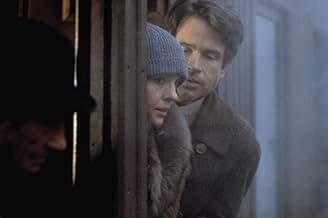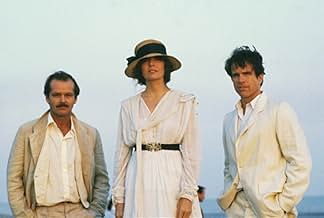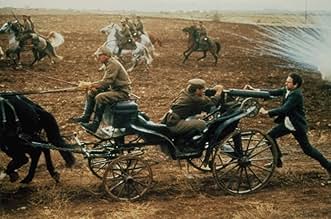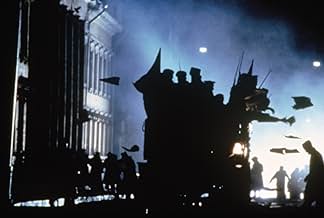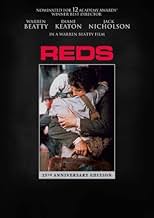IMDb रेटिंग
7.3/10
26 हज़ार
आपकी रेटिंग
अपनी भाषा में प्लॉट जोड़ेंA radical American journalist becomes involved with the Communist revolution in Russia, and hopes to bring its spirit and idealism to the United States.A radical American journalist becomes involved with the Communist revolution in Russia, and hopes to bring its spirit and idealism to the United States.A radical American journalist becomes involved with the Communist revolution in Russia, and hopes to bring its spirit and idealism to the United States.
- 3 ऑस्कर जीते
- 22 जीत और कुल 37 नामांकन
Eleanor Wilson
- Mrs. Reed
- (as Eleanor D. Wilson)
फ़ीचर्ड समीक्षाएं
.
I am old enough to have lived through (probably) three different Americas. These are radically different worlds. It isn't just the mood, styles or state of the economy; its the adoption of a whole cosmology. Religions change under our feet. Family, love, belonging. These things are malleable yet largely beyond our control and we forget what "things were like." Memory always is constructed in terms of the present world.
Always.
So projects like this are necessary. We cannot know who we are unless we remind ourselves who we were.
The ordinary fold here is a romance, folded into grand political actions. Here they are a bit more cerebral than usual, but never getting past the notion of simple justice.
The more unusual and complex fold is that we see a story based on real events and people. Interspersed with that story are interviews of people who were personally involved in the story. These are remarkable, the way they are captured and the way they are edited to overlap with and annotate the story. But much more engaging is that these are enticing people, many with minds and phases that invite us into their faces made warmer and more open by Beatty's camera. I compare this to the "Up" serious and the contrast is astonishing. True, here we want to be informed about the lives of others, and the "Up" goals pretend that the people randomly selected decades ago are remotely worth knowing.
But these folks are. We want more, simply based on their implicit invitation, and we carry ourselves into the narrative more forcefully, sort of like the characters do. This is folding doing its job and doing it well. They remember. I remember, and therefore am.
Ted's Evaluation -- 3 of 3: Worth watching.
I am old enough to have lived through (probably) three different Americas. These are radically different worlds. It isn't just the mood, styles or state of the economy; its the adoption of a whole cosmology. Religions change under our feet. Family, love, belonging. These things are malleable yet largely beyond our control and we forget what "things were like." Memory always is constructed in terms of the present world.
Always.
So projects like this are necessary. We cannot know who we are unless we remind ourselves who we were.
The ordinary fold here is a romance, folded into grand political actions. Here they are a bit more cerebral than usual, but never getting past the notion of simple justice.
The more unusual and complex fold is that we see a story based on real events and people. Interspersed with that story are interviews of people who were personally involved in the story. These are remarkable, the way they are captured and the way they are edited to overlap with and annotate the story. But much more engaging is that these are enticing people, many with minds and phases that invite us into their faces made warmer and more open by Beatty's camera. I compare this to the "Up" serious and the contrast is astonishing. True, here we want to be informed about the lives of others, and the "Up" goals pretend that the people randomly selected decades ago are remotely worth knowing.
But these folks are. We want more, simply based on their implicit invitation, and we carry ourselves into the narrative more forcefully, sort of like the characters do. This is folding doing its job and doing it well. They remember. I remember, and therefore am.
Ted's Evaluation -- 3 of 3: Worth watching.
"Reds" is a 200-minute epic masterpiece which deals with left-wing American journalist John Reed (Warren Beatty in an Oscar-nominated performance) and his coverage of the Russian Revolution of the 1910s. Beatty's passion is what carries this ambitious film, which could have easily been a multi-million dollar disaster. His Oscar-winning direction, screenplay, and overall performance carry the film as far as it can possibly go. The top-flight performances by Diane Keaton, Jack Nicholson (both Oscar-nominated), and Maureen Stapleton (Oscar-winning) all add great depth to the performance. Paul Sorvino, Edward Herrmann, and Gene Hackman also make lasting impressions in supporting roles. Overall a great achievement all the way around. 5 stars out of 5.
This is an interesting film, all the more so because it is meant to tell a true story (insofar as any film of real events is true!)
I suppose you'll either like it or loathe it. If you like it, good; it isn't a bad film, but a bit of an idea of European history will help you.
If you you fall into the latter category loathe it because you think it's a bad film not because of the stupid bigotry shown in some of the other reviews here which seem to be so hung up on the USA and Mom and apple pie that they see "Commies" in even thinking about the event of the early 20th century!
After seeing it it made me interested enough to find out about John Reed. You might not like what he thought, you might not like Warren Beatty and what he thinks but for heaven's sake don't rubbish this film simply because it's about a political system you may not like, or have been indoctrinated not to like!
It's not brilliant but neither is it a "love poem to communism".
I suppose you'll either like it or loathe it. If you like it, good; it isn't a bad film, but a bit of an idea of European history will help you.
If you you fall into the latter category loathe it because you think it's a bad film not because of the stupid bigotry shown in some of the other reviews here which seem to be so hung up on the USA and Mom and apple pie that they see "Commies" in even thinking about the event of the early 20th century!
After seeing it it made me interested enough to find out about John Reed. You might not like what he thought, you might not like Warren Beatty and what he thinks but for heaven's sake don't rubbish this film simply because it's about a political system you may not like, or have been indoctrinated not to like!
It's not brilliant but neither is it a "love poem to communism".
Bolshevik leader V.I. Lenin once wrote, "The capitalists will sell us the rope with which we will hang them."
Lenin's quote came to mind when I was watching one of the most spellbinding movies to come along in years,and not since David Lean's brilliant 1965 epic classic "Doctor Zhivago" hasn't been a movie in recent memory that has come close. That motion picture is "Reds",released in 1981 by Paramount Pictures. The film was Warren Beatty's peeve project which he served not only as it star,but also the co-writer and direction. Director Warren Beatty's epic love story about American writers John Reed and Louise Bryant,set amid of the turbulence of American politics in the 1910's World War I and the Russian revolution that set this movie into plain focus. The movie itself is astounding to behold and is a tragic love story between the writers John Reed(Warren Beatty),and Louise Bryant(Diane Keaton). But it creatively used artsy,radical Greenwich Village in the 1910's-and such as real-life characters as playwright Eugene O'Neill(Jack Nicholson),and anarchist activist Emma Goldman(Maureen Stapleton)-as well as the drama of the Russian Revolution and the subsequent civil war as the principal landscapes in which their relationship plays out.
Director Beatty also made creative use of on-camera "testimony" by the likes of novelists Henry Miller and Rebecca West,Republican politician Hamilton Fish,comic George Jessel and civil libertarian Roger Baldwin. These senior citizens recall,with varying degrees of historical accuracy,Reed,Bryant and the times in which they lived. "Reds" shows convincingly that many of the contemporary issues in politics and culture have their antecendents in the first debates of the 20th century. Debates over birth control and abortion,marriage and commitment,public life versus private life,revolution versus reform are given full expression from varying viewpoints throughout the lengthy film(which runs over three hours). To Beatty's credit,his film captures the excitement the Bolshevik revolution stirred,both inside and outside Russia while revealing how the Bolshevik leadership quickly began to suppressing dissent within the revolutionary ranks on the way to becoming a dictatorship with a country that is in constant turmoil. Beatty's efforts certainly paid off artistically,bringing him prestige to him and Paramount making "Reds" a huge box office success for the studio when it premiered in theatres around Christmas of 1981.
"Reds" became one of the top highest grossing pictures of that year,and it paid off in high standards too. "Reds",which received 12 Academy Award nominations including Best Picture,lost an upset to Hugh Hudson's "Chariots Of Fire" in the Best Picture category. However it won three Oscars for Best Director(Warren Beatty),Best Supporting Actress(Maureen Stapleton),and Best Cimematopgraphy(Vittorio Storaro). Eventually,"Reds" made more than $40 million at the domestic box office,and once international figures were added in,it became one of the top grossing films of the 1980's. A feat Warren Beatty is still proud of to this day.
Lenin's quote came to mind when I was watching one of the most spellbinding movies to come along in years,and not since David Lean's brilliant 1965 epic classic "Doctor Zhivago" hasn't been a movie in recent memory that has come close. That motion picture is "Reds",released in 1981 by Paramount Pictures. The film was Warren Beatty's peeve project which he served not only as it star,but also the co-writer and direction. Director Warren Beatty's epic love story about American writers John Reed and Louise Bryant,set amid of the turbulence of American politics in the 1910's World War I and the Russian revolution that set this movie into plain focus. The movie itself is astounding to behold and is a tragic love story between the writers John Reed(Warren Beatty),and Louise Bryant(Diane Keaton). But it creatively used artsy,radical Greenwich Village in the 1910's-and such as real-life characters as playwright Eugene O'Neill(Jack Nicholson),and anarchist activist Emma Goldman(Maureen Stapleton)-as well as the drama of the Russian Revolution and the subsequent civil war as the principal landscapes in which their relationship plays out.
Director Beatty also made creative use of on-camera "testimony" by the likes of novelists Henry Miller and Rebecca West,Republican politician Hamilton Fish,comic George Jessel and civil libertarian Roger Baldwin. These senior citizens recall,with varying degrees of historical accuracy,Reed,Bryant and the times in which they lived. "Reds" shows convincingly that many of the contemporary issues in politics and culture have their antecendents in the first debates of the 20th century. Debates over birth control and abortion,marriage and commitment,public life versus private life,revolution versus reform are given full expression from varying viewpoints throughout the lengthy film(which runs over three hours). To Beatty's credit,his film captures the excitement the Bolshevik revolution stirred,both inside and outside Russia while revealing how the Bolshevik leadership quickly began to suppressing dissent within the revolutionary ranks on the way to becoming a dictatorship with a country that is in constant turmoil. Beatty's efforts certainly paid off artistically,bringing him prestige to him and Paramount making "Reds" a huge box office success for the studio when it premiered in theatres around Christmas of 1981.
"Reds" became one of the top highest grossing pictures of that year,and it paid off in high standards too. "Reds",which received 12 Academy Award nominations including Best Picture,lost an upset to Hugh Hudson's "Chariots Of Fire" in the Best Picture category. However it won three Oscars for Best Director(Warren Beatty),Best Supporting Actress(Maureen Stapleton),and Best Cimematopgraphy(Vittorio Storaro). Eventually,"Reds" made more than $40 million at the domestic box office,and once international figures were added in,it became one of the top grossing films of the 1980's. A feat Warren Beatty is still proud of to this day.
Imagine going into a room and telling a studio you want to make a film about American Communist reporters during the 1917 Russian revolution and that it will be over three hours long and you won't even get to Russia until almost two hours in. But it was really very simple. It was Warren Beatty doing the plugging. And it actually made money. Today getting this kind of film made would be impossible for anybody. The suits want creatures from some other world wearing capes and carrying tridents spouting vague dialogue that is supposed to sound deep with lots and lots of special effects. But I digress.
So this is basically the story of John Reed and Louise Bryant, two left-wing writers and activists whose affair and marriage only lasted five years, ending with his death in Russia in 1920, but covering some incredibly important American and world history. Bryant first meets Reed when he speaks at the Liberal Club in Portland, Oregon. She's pretentious - denying that she's married or even believes in marriage - as she and Reed have an all-night discussion of writing and politics - and nothing else - at her studio around the corner. When they encounter each other by chance some days later, surrounded by people who know them both, the truth comes out in an extended meet cute encounter that Bryant is married to a dentist and living a bourgeoisie lifestyle. But she is dissatisfied and wants more.
At Reed's invitation, Bryant follows Reed back to New York City and moves into his apartment. But at first she isn't respected when she's cross examined by Reed's highbrow circle of radical friends, asked what she does, and she says she writes about "everything". The couple fights, makes up, engages in socialist politics and activism, and are separated for long periods of time, usually because Reed is galivanting about the country writing about this or that. Ultimately, the Czar is overthrown in Russia and the pair go there when it looks like the Bolsheviks will overthrow the provisional government instituted after the downfall of the Czar.
It's downhill from there for our socialist couple, because it is at this point they encounter the tired but true old saying that absolute power corrupts absolutely. Back in the United States, energized by what has happened in Russia, the Socialist Party fractures into a conventional and Communist wing, and then the Communist wing fractures yet again, largely over the issue of control. When Reed returns to Russia after the Communists have had a chance to consolidate power, he finds them to have become dogmatic and are censoring what he is allowed to say when speaking to crowds. He dies young and disillusioned in a Russian hospital.
Technically this was for sure a great accomplishment. It does a good job of drawing you into the time and place it is set. I felt like I was experiencing these important events myself rather than just watching them be recreated onscreen. The witnesses add some context, although I wish I knew more about them. I remember at the time wondering when these conversations were recorded, because in 1981 they would have had to be over 90 to have known either Reed or Bryant. The love story is convincing although the couple spends long periods of time apart.
I'd recommend it, but realize it is not for the faint of heart or those short in attention span.
So this is basically the story of John Reed and Louise Bryant, two left-wing writers and activists whose affair and marriage only lasted five years, ending with his death in Russia in 1920, but covering some incredibly important American and world history. Bryant first meets Reed when he speaks at the Liberal Club in Portland, Oregon. She's pretentious - denying that she's married or even believes in marriage - as she and Reed have an all-night discussion of writing and politics - and nothing else - at her studio around the corner. When they encounter each other by chance some days later, surrounded by people who know them both, the truth comes out in an extended meet cute encounter that Bryant is married to a dentist and living a bourgeoisie lifestyle. But she is dissatisfied and wants more.
At Reed's invitation, Bryant follows Reed back to New York City and moves into his apartment. But at first she isn't respected when she's cross examined by Reed's highbrow circle of radical friends, asked what she does, and she says she writes about "everything". The couple fights, makes up, engages in socialist politics and activism, and are separated for long periods of time, usually because Reed is galivanting about the country writing about this or that. Ultimately, the Czar is overthrown in Russia and the pair go there when it looks like the Bolsheviks will overthrow the provisional government instituted after the downfall of the Czar.
It's downhill from there for our socialist couple, because it is at this point they encounter the tired but true old saying that absolute power corrupts absolutely. Back in the United States, energized by what has happened in Russia, the Socialist Party fractures into a conventional and Communist wing, and then the Communist wing fractures yet again, largely over the issue of control. When Reed returns to Russia after the Communists have had a chance to consolidate power, he finds them to have become dogmatic and are censoring what he is allowed to say when speaking to crowds. He dies young and disillusioned in a Russian hospital.
Technically this was for sure a great accomplishment. It does a good job of drawing you into the time and place it is set. I felt like I was experiencing these important events myself rather than just watching them be recreated onscreen. The witnesses add some context, although I wish I knew more about them. I remember at the time wondering when these conversations were recorded, because in 1981 they would have had to be over 90 to have known either Reed or Bryant. The love story is convincing although the couple spends long periods of time apart.
I'd recommend it, but realize it is not for the faint of heart or those short in attention span.
क्या आपको पता है
- ट्रिवियाReportedly, Warren Beatty reshot some scenes up to 35 times. Paul Sorvino said he did as many as 70 takes for one scene, and Maureen Stapleton said she did as many as 80 takes for another. Reportedly, of this, she famously once said to Warren Beatty, "Are you out of your fucking mind?" This earned her a round of applause from the crew.
- गूफ़The Finnish doctor tells Reed that his blood pressure is too high, but at that time, hypertension was not considered a problem by most doctors, who did not even consider treating it. Not until the mid-'40s did doctors begin to understand the dangers of high blood pressure.
- भाव
Eugene O'Neill: If you were mine, I wouldn't share you with anybody or anything. It'd be just you and me. We'd be the center of it all. I know it would feel a lot more like love than being left alone with your work.
- क्रेज़ी क्रेडिटAs the credits roll, additional interviews with the 'witnesses' play.
- इसके अलावा अन्य वर्जनThree seconds of horse falls were cut from the British version. The DVD supplements showing these shots are also cut in England.
- कनेक्शनFeatured in Sneak Previews: Rollover, Quartet, My Dinner with Andre, Reds (1981)
- साउंडट्रैकYou're a Grand Old Flag
Written by George M. Cohan
टॉप पसंद
रेटिंग देने के लिए साइन-इन करें और वैयक्तिकृत सुझावों के लिए वॉचलिस्ट करें
- How long is Reds?Alexa द्वारा संचालित
विवरण
- रिलीज़ की तारीख़
- कंट्री ऑफ़ ओरिजिन
- भाषाएं
- इस रूप में भी जाना जाता है
- Comrades
- फ़िल्माने की जगहें
- Senate Square, हेल्सिंकी, फ़िनलैंड(on location)
- उत्पादन कंपनियां
- IMDbPro पर और कंपनी क्रेडिट देखें
बॉक्स ऑफ़िस
- बजट
- $3,20,00,000(अनुमानित)
- US और कनाडा में सकल
- $4,03,82,659
- US और कनाडा में पहले सप्ताह में कुल कमाई
- $23,25,029
- 6 दिस॰ 1981
- दुनिया भर में सकल
- $4,03,82,788
इस पेज में योगदान दें
किसी बदलाव का सुझाव दें या अनुपलब्ध कॉन्टेंट जोड़ें



